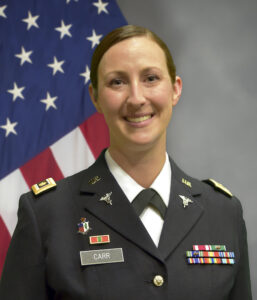There are many pathways for Army officers in military medicine, but the opportunity to experience every part of an organization is rare. It is a journey that Lt. Col. Katie Carr, military deputy director for the U.S. Army Medical Research and Development Command’s Military Infectious Disease Research Program has experienced across 14 years at the command, growing from a young Soldier to the female leader she is today.
Now that Carr has officially promoted from the rank of major to lieutenant colonel, she plans to both make the MRDC mission the entirety of her Army career and call the organization home.
“Now that I have gotten the complete perspective of MRDC, I owe it to the command to take opportunities that push me as a leader, but that also help the organization be successful, especially during a time of transition” says Carr.
What started Carr’s journey as leader all begin with a dream to attend the University of Wisconsin-Madison. She knew her desire to attend college fully funded was an opportunity that ROTC would afford, and after four years as a Cadet at UW-Madison, Carr commissioned as a 71 Alpha microbiologist and Medical Service Corps officer in 2006.
“I found a love for microbiology during classes at the University of Wisconsin-Madison, and discovered through an article I read that there were microbiologists in the Army,” says Carr. “I found the contact information for the microbiologist featured in the article and sent an email asking a ton of questions. He not only took time to answer my questions but put me in contact with an Army Microbiology Consultant who together worked to get me an education delay so that I could come into the Army as a microbiologist after graduate school.”
Fortunately, those individuals alongside the Army provided Carr the ability to obtain an education delay and afford her the ability to attend graduate school at the University of Michigan to obtain her Ph.D. to study anthrax pathogenesis and its military relevance. Upon graduation in 2010, she would embark on her first Army assignment at MRDC’s Research Institute of Infectious Diseases researching anthrax prevention.
However, RIID is just one of the many diverse assignments that being an Army scientist has given her. Aside from her role at MIDRP, Carr’s other career milestones have included working at the Eisenhower Army Medical Center at Fort Eisenhower in clinical microbiology, working to support and train the U.S. Central Command on microbiology as a part of a preventative medicine unit deployment in 2016, and serving as a program manager at MRDC’s Medical Materiel Development Activity.
“Working in each of these organizations has allowed me to experience the complete lifecycle of work conducted at MRDC, from the execution of our research to setting priorities for labs to ensure they align with DOD and operational needs,” says Carr.
USAMMDA is where Carr found her niche as a part of the Warfighter Protection and Acute Care Program, which is where she learned what it takes for the DOD to deliver medical capabilities to the field. That included working with the team to get malaria drugs approved by the Food and Drug Administration.
Carr credits her success and now long-term career with the decision to join ROTC at UW-Madison. It is one she says has given her opportunities that she never once thought of but is grateful for.
“One of the best things about coming in and out of this organization is that I’ve gotten to work alongside this amazing team in different capacities,” says Carr. “Each job brings me a new perspective of the important work we do, and I’m grateful that I will be able to continue to contribute to the MRDC mission.”
